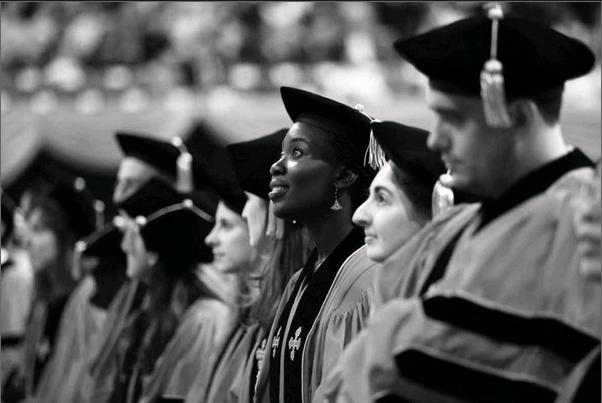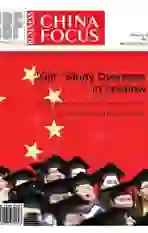“Gilt”Study Overseas in Shadow
2018-01-25



Since the visa policy and China economy devel- opments changing in 2005, Chinese students overseas are facing new challenges and difficulties. As the major vital force in Americas overseas student market, Chinese overseas students are becoming younger. However, with the massive increase of the number of Chinese students, the negative news released kept shocking Chinese citizens. From the abuse of fellow students in California to the organized group cheating of hundreds of students in Iowa University, the shocking news reflect the tragedy of many families of Chinese overseas students. The students involved above are certainly wrong, but the new challenge of honesty crisis faced by Chinese overseas students is more urgent. According to CNN news, since many Asian students were found cheating in the SAT test held on October 11th, 2014 by ETS, the authority decided to delay the release of all Chinese and South Korean studentsscores. At the same time, the SAT test results of all Chinese and South Korean students were to be re-examined in four weeks.
It all began with a cell phone message received by a Chinese female student during the test. It is reported that the SAT answers she received was provided by an overseas education institution. This cheating behavior gave rise to a series of effects. The test results of all Chinese and South Korean students from 14 regions taking tests on that day were required to go through second examination. About 10,000 Chinese students were directly affected. They were also faced with the risk of deferred entry, score cancelation or even banned from taking more tests. Behind the prevalence of cheating among overseas students, lies the blind chasing of high score and famous universities by Chinese parents and students. The seriousness of forging application information and cheating is not highly concerned. In order to send their children to the most satisfying university, some parents even pay high price for agencies to counterfeit application qualification for them. Many interests driven overseas study agencies in China add fuel to the fire of cheating for high score even violating the laws and regulations. College entrance channels are rather single in China, which relies on the college entrance test results; so many Chinese students are not that familiar with the complicated recruitment processes of foreign universities.
They are not fully prepared of the culture and habit to make a whole set of application materials, which give overseas study agencies room to play. The climate of cheating is also nourished. Students entering foreign universities by cheating and counterfeit will face more academic challenges during their study, which give more chances for grey industrial chains such as graduation paper ghostwriting agencies. Some students even purchase fake graduation diploma to stall their parents off. The cheating in taking entrance examinations not only do harm to a single students academic career, but also bring bad influence to the entrance rate of the whole Chinese student community. Currently, overseas major colleges begin to seriously check application materials of Chinese students, to avoid any cheating or fabricated information. Many colleges will carefully review the academic background of applicants with high score. Sometimes, students even need to prove their academic ability by taking interviews or releasing personal statement. Just because of the prevalent cheating and plagiarism in Chinese applicants, their quota in overseas colleges is largely reduced. These colleges would rather recruit domestic high school graduates. What goes around comes around, the cheating finally does harm to the cheaters.endprint

Whats worse, the whole Chinese applicants for overseas study are also harmed. The White Book of the Current Situation of Chinese Students in America (hereinafter referred as The White Book) released in June, 2015 again rose concerns of the public towards the overseas students community. According to the American education institution WholeRen, about 8000 Chinese students were expelled across America in the year of 2014. Although the relevant materials released by the report need further proving, it brings a seldom known group —the expelled overseas students –to the light, which rings the alarm for those preparing for overseas study. Those students were expelled mainly for academic problems, morality and legal violating, including cheating, class skipping, improper behaviors and poor grades. Some students have been directly expelled due to their poor grades. Others expelled are found cheating or help with graduation paper plagiarism. Some overseas students are not able to cover the graduate credit due to their poor learning ability. They have no graduate certificates or diploma. Besides, overseas students are lack of understanding of the cultural differences between China and America. Some overseas students are not serious about academic authenticity, which led to frequent cheating events.
Apart from the academic expelling reasons mentioned above, cultural and legal conflicts are also included. Some students were sued due to their involvement in campus violence issues. These extreme cases mention us to balance the development of both school work and personality. Breaking the law is a big problem among Chinese students. According to The White Book, among those investigated Chinese students, about 5% have violated the local traffic rules, illegally holding guns, or invaded privacy by using other peoples SSN. Some Chinese students were even accused of criminal offences of sexual abuse. The shocking case of American high school overseas students abusing their compatriots has aroused great repercussions. A number of student defendants face numerous felony charges, including unlawful imprisonment, kidnapping and torture. The torture charge only can lead to imprisonment for life. These high school foreign students are still young and some are even under age. Their ignorance of local laws caused big mistakes. Since Asian students encountered racial quota in recent years, the enrollment rates in prestigious American universities have been declining year by year, which put racial quota against Asian students under the spotlight. On May 15, 2015, a total of 64 Chinese, Indian, Korean, and Pakistani communities and organizations participated in rights defense campaign to protest against Harvards discrimination in student admissions.endprint

This is the largest joint effort made by Asian Americans in the pursuit of equality and education rights in the past 20 years, arousing the attention of the U.S. federal legislators, the Ministry of Education and the extensive coverage by the relevant mainstream media.According to the Asian community in America, the racial discrimination is manly formed by two reasons: 1, Historical Culture: the forcedly implemented actions, aiming to protect Asians and Hispanics with underdeveloped education, actually brought racial inequity in the past fifty years. Their education hasnt been improved by these palliatives. 2, Discrimination Culture: prestigious Ivy League universities discriminate Asians in the perspective of culture identity acceptance. During the recruitment process, many American prestigious universities think Asian students are only good at mathematics, physics and chemistry and are bad at communication, innovation and leadership. Under these stereotypes, Asian students often get low scores in subjective assessments of communication and leadership abilities. However, considering the outstanding achievements made by Asians in scientific innovation and entrepreneurship, the discrimination has no realistic basis. Its not hard to see, its far not enough to train those premature overseas students only by schools and families education and supervision. An emerging mode of after school full-time boarding education has been accepted by many middle and high schools in America. After all, overseas study involve much more than taking lessons.
Before you head overseas, be sure to check out these disadvantages of study abroad!
Cultural Challenges
When you arrive in the United States, you will be immersed in a different culture than you are used to at home. Known as “culture shock,” the intense feelings of homesickness and irritability you may experience when traveling to a new country with a different language and customs can feel overwhelming at first. American customs at restaurants, in the classroom, and in everyday life can feel strange if you are used to another culture. For example, in Japan it is common to bow when meeting someone new, but in the U.S. this would be highly irregular. In Spain, people commonly touch and bump into each other in busy areas, but in the U.S. people value“personal space” and do not wish to be touched in any way by strangers. To get up to speed quickly, on everything from tipping to communication styles, check out the following tips to overcoming cultural barriers in the United States:endprint
Solutions:
Prepare for culture shock and understand common remedies. Teacher-student relationships are rather informal in the United States- particularly compared to the Asian education system. Get an understanding of how students and teachers interact. Be open to making new friends as soon as you can upon arrival. Also look to your fellow study abroad students as a support network and a place to share and learn about common practices in the United States. Read about tipping practices in the United States. Check out this guide to navigating transportation in the U.S.
Financial Challenges
College in the United States is expensive. Out-of-state tuition at a public university costs “an arm and a leg,” and private schools cost even more. According to CollegeData.com, a moderate budget for a private college is $47,831 per year. With that kind of expense, it is important to figure out how to pay for tuition and expenses before you arrive. An additional financial challenge many international visitors to the United States dont expect is the cost of health insurance. There is no automatic, universal healthcare for Americans or visitors, so make sure you get good insurance through your university. If your university does not offer you a health plan, look into international student health insurance, such as StudentSecure from HCC Medical Insurance Services, to make sure you dont end up with big medical bills in addition to your education, room, and board costs.
Solutions:
There is a scholarship for nearly every topic of study and minority group. Other scholarships are merit-based (based on high achievement and extracurricular activity) or need-based(applied when an applicant meets certain financial criteria). Some are available for United States citizens only, but many are available for anyone. You cant get the scholarship unless you apply, so talk to your schools financial aid office for scholarships specific to your school, and look at an online directory like Fastweb for more options.
Apply for other financial aid, which may include grants and student loans. While most student loans are only available to United States citizens, your universitys financial aid office may have additional options for international students.
Work a part-time job. Some on-campus jobs for students include positions in the school cafeteria, bookstore, library, or gymnasium. While its unlikely youll be able to earn enough to pay the majority of your expenses, a part-time job can help cover books, clothing, and personal expenses. Be sure to note U.S. working regulations for international students.endprint
Social Challenges
Not only do students and teachers interact differently in the United States, but people interact differently in social situations as well.
Starting out as a new student in a program abroad can feel intimidating and lonely, so try to step out of your comfort zone and get to know as many people as you can while you are getting acquainted with your new home for the duration of your studies.
Solutions:
Get to know other students in your program who are going through the same social changes. Attend optional meetings and outings and sign up for any weekend trips or excursions.
Get involved in student groups on campus- volunteer and academic groups are generally a great place to start. Your university should have a listing of all active student groups available.
Befriend local students, as they can help get you acquainted with the school and introduce you to new friends. Sit next to them in class and offer to partner with them on projects.
Attend local events. Free apps like Now and Like a Local can zero in on your location to help you find cool spots and happenings nearby.
Academic Challenges
With so much else going on, it can be easy to focus on everything but your school work, but remember that your academic experience is what brought you to the United States. While your studies should always come first, this can be a challenge if you discover that U.S. language and classroom expectations are different than in your home country. Follow these solutions, focus on your studies, and embrace your new culture so you can have an educational and fulfilling experience.
Solutions:
Talk to the professor. While it may be intimidating to talk to a professor who lectures in front of hundreds of students at a time, his or her job is to teach. Take advantage of office hours if you are unable to stay after class.
Ask your guidance counselor for a student mentors email address and connect with him or her.
If you are not clear on an assignment, talk to the professor, a teachers assistant, or another student from your class. In America, study groups are common. Joining a study group for your difficult classes can help you learn better, collaborate with other students, and give you an opportunity to receive a little extra help clarifying assignments and coursework.endprint
